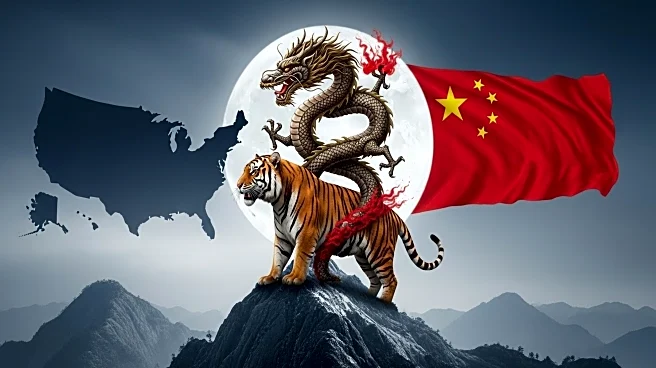What's Happening?
China and North Korea have committed to opposing 'hegemonism' and 'unilateralism' in global affairs, as stated by the Chinese Ministry of Foreign Affairs. This development follows a meeting between Chinese Foreign Minister Wang Yi and North Korean Foreign Minister Choe Son Hui in Beijing. The talks occurred shortly after North Korean leader Kim Jong Un visited China for an event commemorating Japan's defeat in World War II. The Chinese Foreign Ministry emphasized the importance of strengthening coordination and collaboration with North Korea to protect shared interests and promote international fairness. North Korea expressed support for China's initiatives aimed at fostering a multipolar world and resisting power politics. The meeting is seen as a response to ongoing tensions with the United States, which has been in conflict with both nations over various issues, including trade and North Korea's nuclear program.
Why It's Important?
The collaboration between China and North Korea to resist hegemonism and unilateralism poses a challenge to U.S. influence in international affairs. This alliance could shift the balance of power, particularly in Asia, where the U.S. has significant strategic interests. The partnership may lead to increased diplomatic and military cooperation between China and North Korea, potentially complicating U.S. efforts to address security concerns related to North Korea's nuclear ambitions. Additionally, the move could impact global trade dynamics, as China and North Korea seek to counter U.S. policies perceived as unilateral. The strengthening of ties between these nations may also influence other countries to reconsider their alliances and strategies in the region.
What's Next?
The meeting between China and North Korea may lead to further diplomatic engagements and strategic partnerships aimed at countering U.S. influence. Both countries are likely to continue developing initiatives that promote a multipolar world order. The U.S. may respond by reinforcing its alliances in the Asia-Pacific region and increasing diplomatic pressure on North Korea regarding its nuclear program. Additionally, the U.S. could seek to engage China in dialogue to address trade and security issues. The evolving dynamics may prompt other nations to reassess their positions and alliances, potentially leading to shifts in regional and global power structures.
Beyond the Headlines
The alliance between China and North Korea highlights broader geopolitical shifts and the emergence of new power blocs challenging traditional Western dominance. This development raises ethical and legal questions about the balance of power and the role of international institutions in maintaining global stability. The emphasis on a multipolar world order reflects a growing desire among some nations to redefine global governance structures. Long-term implications may include changes in international trade policies, security arrangements, and diplomatic relations, as countries navigate the complexities of a changing geopolitical landscape.








